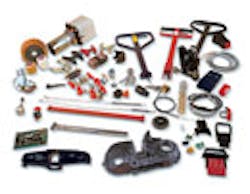The Internet and other forms of electronic communication keep changing how fleets search for and purchase parts for their trucks and related equipment. Fleets will leverage the ease of use and speed of these digital pathways to help lower their equipment operating costs.
“The internet has had a significant impact on parts and service,” Tina Alread, director of sales and marketing for aftermarket parts supplier HDA Truck Pride, told Fleet Owner. “The biggest impact has been access to information – technical information, product interchange data, online catalogs and online ordering, as well as finding parts and service locations.”
More critically, Alread said the Internet has “increased speed and customer expectations. Parts distributors and end users can access information much more efficiently than before. No more waiting for people to call, leave messages, wait for answers. Now, you go online and find the answer.”
She noted that aftermarket parts suppliers like HDA Truck Pride – formed last year from the merger of the Heavy Duty America and Truck Pride groups – are trying to build up their national service capabilities in part based on the advantages of delivering parts information electronically
Uniting over 700 parts and 400 service locations within the HDA organization, and then offering information via the internet helps bring more value to its “end users” – fleets, repair shops, and remanufacturers, she pointed out.
That “digital capability” is also heightening expectations within the trucking industry as well, Alread stressed. “Customers expect faster response time now because of easier access to information. However, in reference to fleets and end users, our experience is that the online ‘self service’ format is growing but still minimal. Our overall estimate would be less than 10% of the [parts] volume, but increasing.”
Thus this digital transition is occurring very slowly in the truck market where parts are concerned, Jim Pennig, vp-business development for aftermarket supplier Vipar Heavy Duty, told Fleet Owner.
“The Internet has proven to be a game-changer in terms of the accessibility and amount of information available for fleets to be able to make informed decisions,” he stated. “It's also provided a delivery method to connect purchasing systems electronically, tying fleets together with their providers.
“However, at this point, we don't believe the heavy-duty segment of the business has migrated to a retail online purchasing method,” Pennig stressed. “The end purchase is still largely taking place between the fleet and provider, which in our case is the aftermarket distributor.”
HDA Truck Pride’s Alread also pointed out that only a minority of fleets right now are outsourcing their parts inventory, due to the advantages offered by rapid ordering over digital channels.
“The fleets that have outsourced this element of their operation are generally government-related operations that are trying to save or rationalize their expense and cash outlays, such as for school bus, county or municipal vehicles,” she noted.
“The [inventory outsourcing] trend also seems to be leaning toward private carriers,” Alread added. “They need equipment to transport their own goods. But their investments may be better utilized in their core businesses, rather than being ‘tied up’ in truck parts replacements and maintenance items.”
About the Author
Sean Kilcarr
Editor in Chief
Sean Kilcarr is a former longtime FleetOwner senior editor who wrote for the publication from 2000 to 2018. He served as editor-in-chief from 2017 to 2018.
